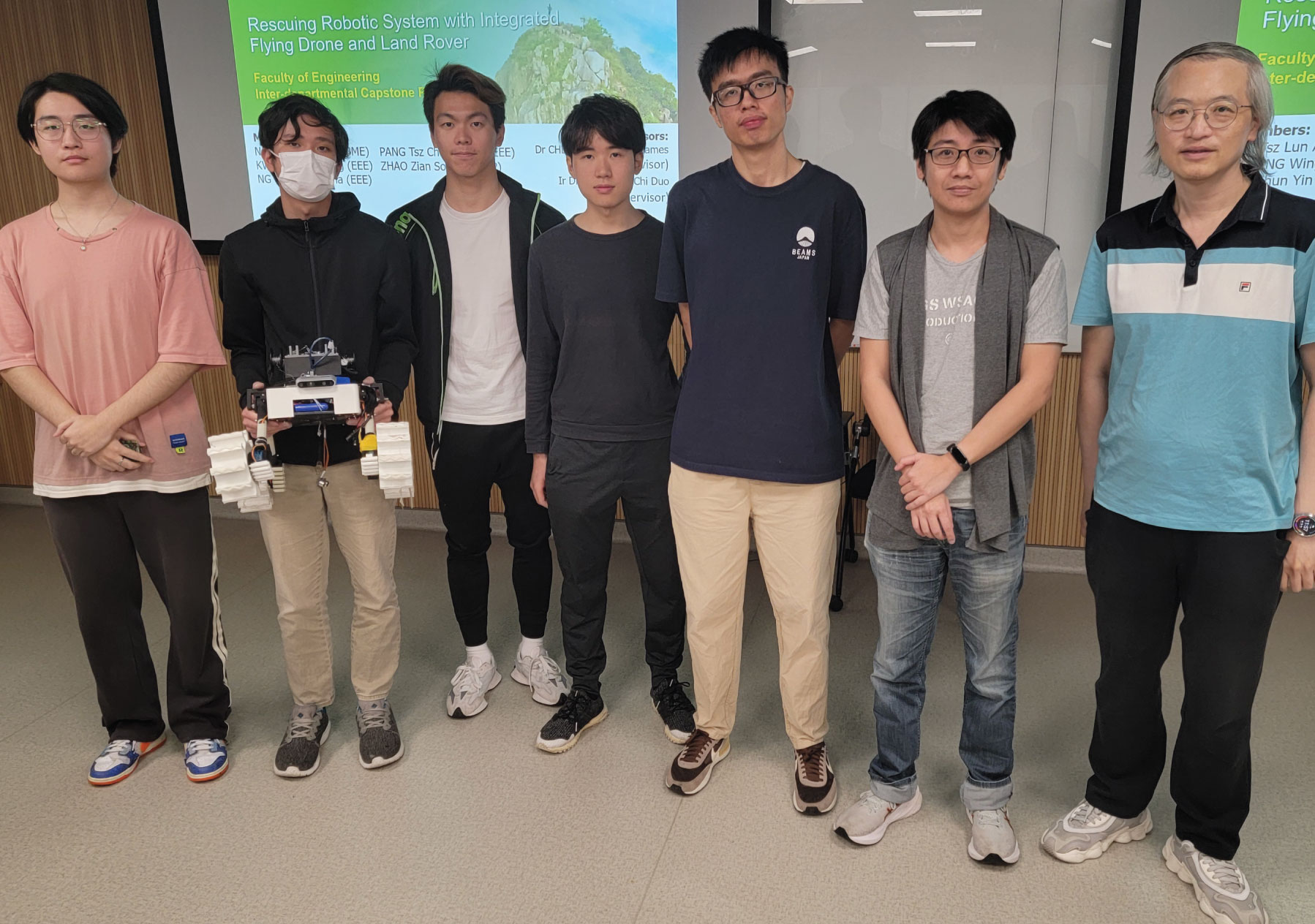Jimi, Alpha, Alex, and Zian embarked on an ambitious Final Year Project to create a rescuing robotic system integrating a flying drone and a Land Rover for countryside search and rescue. Driven by a passion for real-world impact, they combined expertise in computer vision, robotics, and electronics. Zian optimized navigation and object detection, Alpha engineered a rugged, lightweight rover, and Alex developed vital signal detection algorithms. The team overcame technical and time management challenges through collaboration, guidance from professors, and support from PolyU’s resources. Their perseverance and adaptability led to innovative solutions, earning them the Champion and Best Project Award. Through this journey, they gained hands-on skills, learned the value of teamwork, and grew into proactive, resourceful engineers ready for future challenges.

Mr. ZHAO Zian
Mr. KWONG Wing Tung Alex
Mr. NG Chun Yin Alpha
Mr. PANG Tsz Cheong Jimi
Faculty of Engineering
The project required integrating a UAV (drone) and a Land Rover into a single, coordinated robotic system. This involved knowledge of mechatronics—combining mechanical, electrical, and computer engineering to ensure both robots could work together seamlessly for search and rescue missions, including payload management and deployment mechanisms.
Implementing ORB-SLAM3 for navigation and YOLOv8 for real-time object detection demanded expertise in computer vision and AI. This included understanding image processing, feature extraction, simultaneous localization and mapping (SLAM), and training or optimizing neural networks for accurate victim detection in complex environments.
Designing the Land Rover to traverse rough terrain and be carried by a drone required advanced mechanical engineering skills. This included lightweight structural design, terrain-adaptive mechanisms, 3D modeling, and iterative prototyping to ensure durability, compactness, and functionality under real-world conditions.
Developing the electronics layout and power distribution for the Land Rover involved embedded systems knowledge. This included circuit design, sensor integration, power management, and ensuring stable operation of all components, especially in challenging outdoor environments.
Ensuring reliable, long-range communication between the UAV, Land Rover, and base station was critical. This required understanding wireless protocols, signal processing, and the limitations of different technologies (e.g., why 5G was not feasible in rural areas), as well as integrating multiple subsystems (navigation, detection, control) into a robust, unified solution.
Team members had to quickly learn new technologies, such as ORB-SLAM3, YOLOv8, and 3D modeling software, often outside their original field of study. This adaptability and willingness to acquire new skills are essential for lifelong learning, enabling individuals to thrive in rapidly changing environments.
The project presented complex, real-world challenges, from technical integration to communication limitations in rural areas. The team systematically researched, brainstormed, and tested solutions, demonstrating the ability to analyze problems, weigh alternatives, and implement effective strategies—key skills for continuous personal and professional growth.
Working in an inter-departmental team and with external partners like the Hong Kong Police Force required clear communication and teamwork. Sharing ideas, seeking feedback, and leveraging each member’s strengths fostered a collaborative environment, which is vital for success in multidisciplinary and multicultural settings.
Balancing the FYP with other commitments, competitions, and job searches required strong time management. The team learned to prioritize tasks, set deadlines, and sometimes work overnight to meet goals. Effective organization and time management are crucial for lifelong productivity and stress management.
Team members became proactive in seeking help from professors, PhD students, and industry vendors, as well as utilizing university resources. This resourcefulness and initiative in overcoming obstacles and seizing learning opportunities are hallmarks of lifelong learners who continuously seek improvement and innovation.
The pursuit of knowledge is a lifelong journey! To further expand your knowledge and continue your personal and professional growth. Click and explore the following learning resources:
Robotics Integration and Mechatronics
Mechanical Design and Prototyping
Critical Thinking and Problem-solving